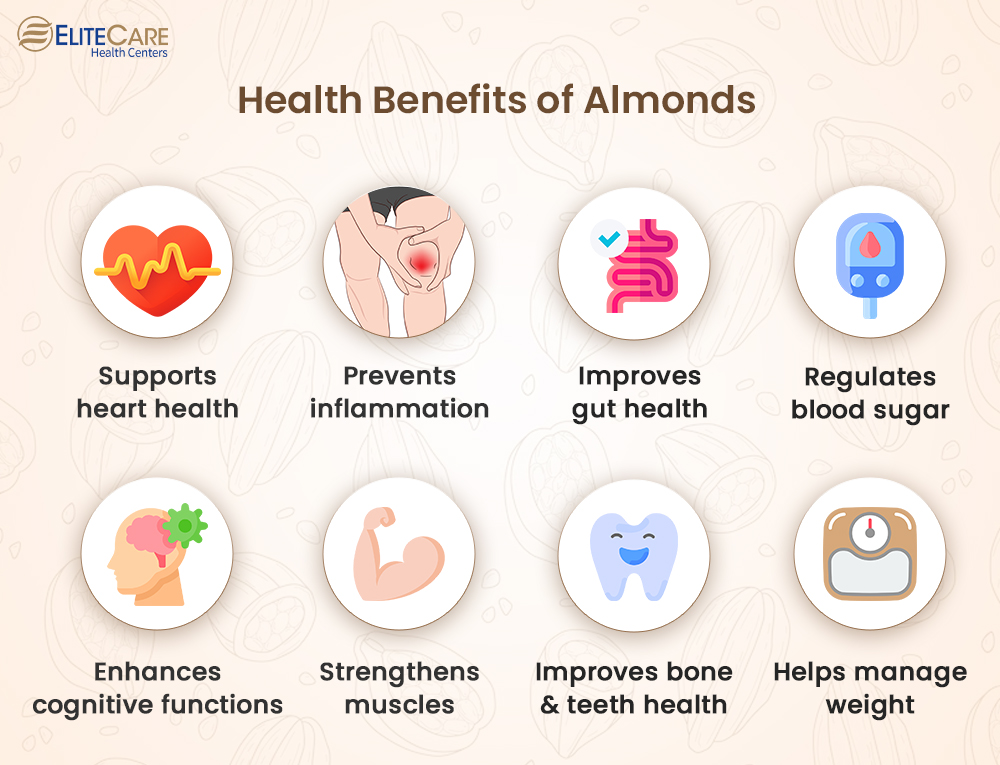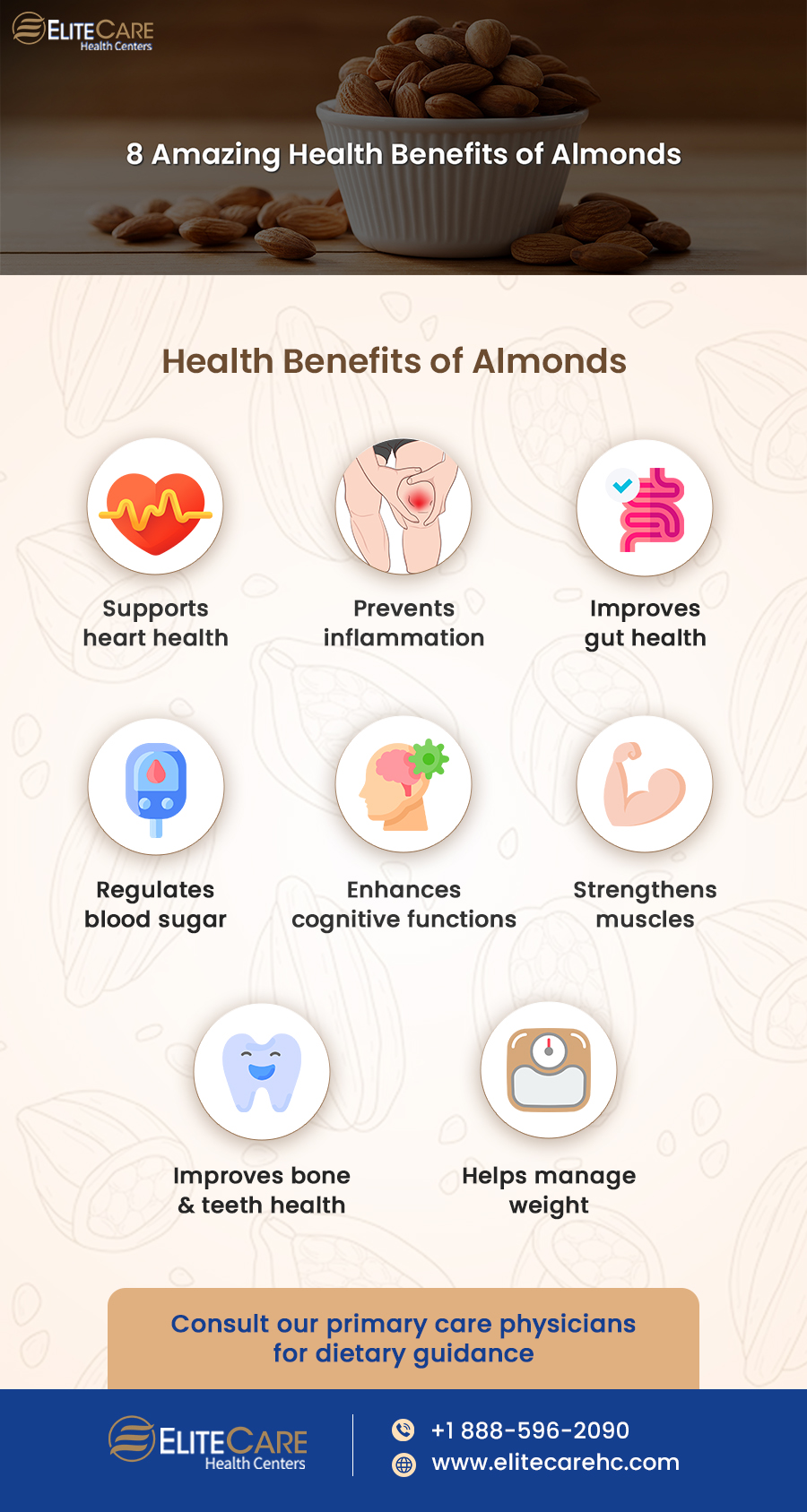
Almonds are not just a tasty snack but a powerhouse of nutrients. Whether one enjoys them as a convenient snack, sprinkles them over morning yogurt, or uses them in cooking and baking – almonds are a versatile ingredient with an array of health benefits.
In this blog post, we will share the science-backed health benefits of almonds and additional aspects one must consider before incorporating it into their diet. Read on for more.
Nutritional Profile of Almonds
The USDA offers the following nutritional data for a 1-ounce portion of almonds (approximately 28g or around 24 whole almonds):
- Calories: 164
- Fat: 14.2g
- Cholesterol: 0 grams
- Sodium: 0.3mg
- Carbohydrates: 6.1g
- Fiber: 3.5g
- Sugars: 1.2g
- Protein: 6g
- Vitamin E: 7.3mg (37% of the Daily Value)
- Magnesium: 76.7mg (19% of the Daily Value)
- Phosphorus: 136 mg (14% of the Daily Value)
- Riboflavin (Vitamin B2): 0.3 mg (17% of the Daily Value)
Health Benefits of Almonds

1. Supports heart health
Almonds are rich in monounsaturated fats, which can help lower LDL (bad) cholesterol levels and reduce the risk of heart disease. Additionally, almonds also contain a good amount of magnesium that helps relax blood vessels. It not only improves blood flow but also reduces resistance in the arteries, eventually lowering overall blood pressure levels.
2. Prevents inflammation
Almonds can reduce inflammation due to their rich content of antioxidants, healthy fats, and bioactive compounds. It is a good source of vitamin E, which acts as a potent antioxidant that helps neutralize free radicals and reduce oxidative stress, lowering the risk of subsequent inflammation they can trigger.
In addition, almonds also contain flavonoids and polyphenols – two plant compounds known for their anti-inflammatory properties. The monounsaturated fats in almonds, particularly oleic acid, can also prevent inflammation by modulating immune responses and gene expression.
3. Improves bone and teeth health
Being rich in calcium, magnesium, and phosphorus, almonds can support bone and tooth health. While calcium is essential for maintaining strong bones and teeth, magnesium is crucial for calcium absorption and bone mineralization. Phosphorus also contributes to the formation and maintenance of bones and teeth.
4. Regulates blood sugar
The combination of healthy fats, fiber, and protein in almonds can slow down digestion and absorption of carbohydrates. As a result of this gradual release of sugars into the bloodstream, it can help prevent rapid spikes and crashes in blood sugar levels.
Additionally, almonds also contain monounsaturated fats and good amount of fiber, which can improve insulin sensitivity and reduce the risk of insulin resistance.
5. Enhances cognitive functions
As a good source of vitamin E, almonds can protect brain cells from oxidative stress and inflammation and improve cognitive decline. Moreover, almonds provide healthy fats, including omega-3 fatty acids – an essential component that helps maintain the structural integrity of brain cell membranes and promote optimal neurotransmitter function.
Almonds are also a good source of riboflavin (vitamin B2) and magnesium, which can support energy production in brain cells, improve brain plasticity and memory power.
6. Strengthens muscles
Almonds are a source of plant-based protein, which is crucial for muscle repair, maintenance, and growth. It provides essential amino acids to support the synthesis of muscle tissues, accelerating muscle recovery after exercise.
7. Improves gut health
Almonds are rich in dietary fiber, which supports gut health, aiding in smooth digestion and preventing constipation. This superfood also contains compounds that may have prebiotic effects.
Additionally, the healthy fat in almonds helps maintain the gut lining, which is essential for preventing leaky gut and inflammation.
8. Aids in weight management
Despite being calorie-dense, almonds can support weight loss if eaten in moderation. The combination of healthy fats, protein, and fiber can help individuals feel fuller for longer, reducing overall calorie intake.
Almonds can aid in weight management through their combination of satiating nutrients. Healthy fats, proteins, and dietary fiber in almonds work together to create a feeling of fullness and satisfaction, helping to curb overeating and reduce overall calorie intake.
Potential Risks Associated with Almond Consumption
Allergic reaction
Some individuals may experience allergic reactions upon consuming almonds or products containing almonds. These reactions can range from mild symptoms like itching, hives, and swelling to severe anaphylactic reactions, which can be life-threatening.
Individuals should consult a primary care physician or a registered dietitian before consuming almonds and any products containing them. Also, always read the food labels carefully to prevent accidental exposure.
Choking
When consumed whole or in large pieces, almonds can pose a choking hazard, especially in elderly individuals. Chewing almonds thoroughly or choosing chopped almonds or almond butter can help reduce this risk. Family members and caregivers should be cautious when giving whole almonds to seniors.
Do Roasted, Salted and Flavored Almonds Differ in Terms of Nutrition?
Roasted almonds are heated in an oven or on a stovetop. While roasting brings out the natural oils in almonds, making it flavorful and crunchier, it may cause some loss of heat-sensitive nutrients like certain vitamins and antioxidants.
Similarly, salted or flavored almonds are roasted almonds coated with salt or seasoning. While salted almonds taste better, they also have a higher sodium content, which is not suitable for those with high blood pressure.
These variations often contain added ingredients like salt, sugar, or artificial flavorings. Therefore, raw or unflavored almonds are the most natural and nutrient-rich choice.
Individuals should always consult their primary care physician or registered dietitian before adding any new ingredient to their regular diet. For dietary recommendations or guidance, contact EliteCare Health Centers and consult a board-certified primary care physician. We are one of the best medical clinics in Florida, specializing in primary care and senior care services, including annual physical exams, preventive care, screenings, vaccinations, and more.






